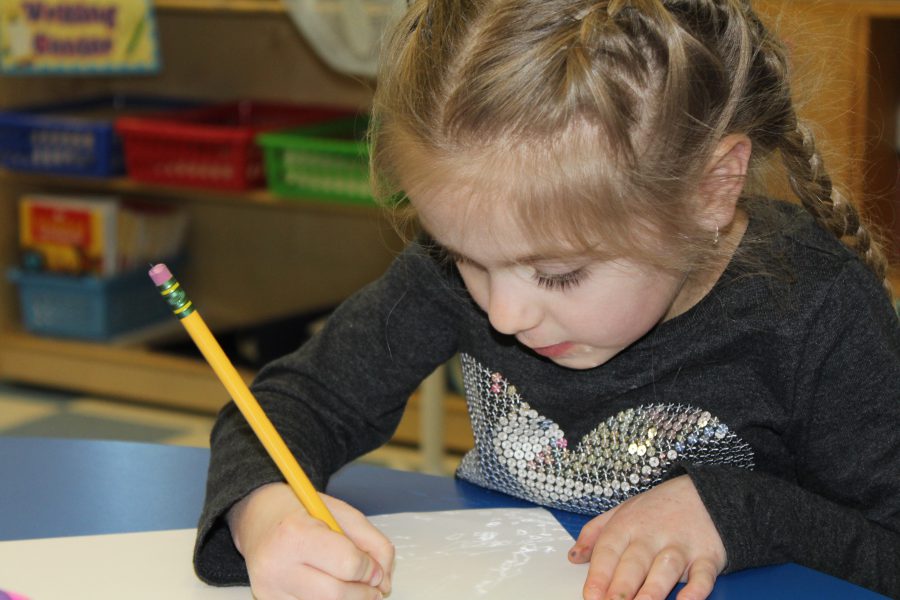
My first grade teacher, Mrs. A., told me I could be a writer. For a voracious young reader, this revelation was life-changing. I’d loved to read and make up my own stories from a very young age, and while my parents encouraged it, no one had ever read one of my stories and told me I could be a writer. That I could write books just like the ones I loved to read. It gave me confidence, a purpose, and a passion that would carry me through to my adult dream: to be a writer. Long before I ever submitted anything to the great wide literary world, and certainly long before any of my work was published, I thought of myself as a writer, a proud identity Mrs. A. had offered me through her early support.
We often focus on the importance of kids developing strong reading skills early. After all, a 2010 report issued by the Annie E. Casey Foundation found that children who do not read at national proficiency standards by the end of third grade are FOUR TIMES as likely to drop out of high school as grade-level-proficient readers. But it’s just as important to encourage kids to develop strong writing skills at a young age, even if they have zero interest in being professional writers when they grow up. This Get Ready to Read article can help assess if your child is developing age-appropriate writing skills (and how to help him or her improve).
As this Science of Learning article points out, writing promotes communication skills, helps kids process emotions, and reinforces learning through reflection. This Learning Disabilities Association of America article titled “Early Writing: Why Squiggles Are So Important” points out that helping kids develop strong literacy skills (that’s both reading and writing) before they enter school is not just about giving them a pen or pencil (or screen); it happens in asking thought-provoking questions, encouraging kids to describe their ideas and dreams and observations, and building connections between what they’re learning and their own lives. It can be as simple as making up a story together or asking the kid(s) illustrate a story you tell.
If you’re not sure where to start, there are some fantastic resources for encouraging kids to write. Here are a few of my favorites: Scholastic Story Starters (fun prompt generators for kids in kindergarten through 6th grade); Fun English Games (writing games for kids in kindergarten through 7th grade); Seven Ways to Encourage Kids’ Writing (Tips for reluctant writers and writing games for kindergarteners through second grade); and this Read-Write-Think article, which includes discussion questions that encourage kids to reflect on what they’re reading and help generate ideas. And if your child struggles with writing, here are a few tips.
One way to encourage kids to write and engage with writing is to provide platforms to share their work. Here a few safe and fun ways for kids to engage with the wider world through writing:
- CLiF’s Write to Read contest is open to 1st through 6th graders (must be overseen by a teacher – find the teacher’s application form here). Students can win a brand new set of books for their classroom by responding to the prompts. The deadline is noon next Friday, October 14. Find more details here.
- The PBS Kids Writers Contest (open to 1st – 3rd graders), which could get your child’s story published on PBS’ website. Take a look at recent winning stories.
- Creating a private blog can be another great way for kids to practice developing their ideas into cohesive arguments while sharing their creative work with family and friends. (Make sure you help your child set this up and configure privacy settings, if you choose to go this route.)
- The Young Writers Project (geared towards teens) has a slew of wonderful prompts to fire up kids’ imaginations, as well as ongoing submission deadlines for kids to share their work. VPR also highlights a Young Writers Project piece each week, which can be a huge confidence boost for young writers just starting to share their work and take pride in it.
- There are also several great writers conferences and residential writing experiences for teens in VT and NH, including the Young Writers Conference at Champlain College, the Governor’s Institute of Vermont for Young Writers, and the National Writing Project of New Hampshire’s summer writing camp for high school students (NWPNH is also a great writing resource for teachers!).
Encourage your kids to write – whether they share it with anyone or not! It can help them process what’s happening in their lives and the world around them, spark their imaginations, and feel pride in their work.
Years after my days of penning stories in Mrs. A’s first grade class, my mom reminded me that I had promised Mrs. A. I’d dedicate my first book to her. And while that first book has yet to be finished, I did send her a copy of the first print anthology in which I had a poem and an essay published, for which I served as poetry editor. I got back a very nice note in the clear, rounded handwriting I remembered, which told me that she’d shown her first grade class that one of her former students had published her writing in an anthology, and they were pretty impressed. Maybe one of them thought “I can be a writer, too.” I hope so.
If you have your own resources, and strategies for encouraging kids to write, please share them in the comments section!



